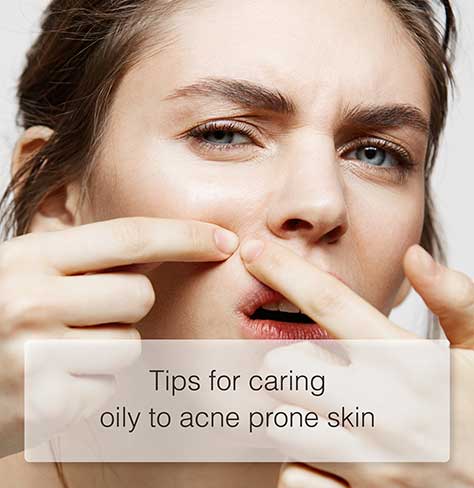Tips for caring oily to acne prone skin

Oily skin and acne:
In our skin, there are sebaceous glands which role is to produce essential fatty acids and lipids in order to maintain moisture and protect the skin from dryness. When the amount of sebaceous gland secretions is in balance, the skin will have a normal appearance, but if the amount of secretions is too high, the skin will look shiny and greasy.
Excessive secretion of sebaceous glands results in closure of skin pores and acne breakouts.
The factors cause skin secrete more sebum include stress, environmental humidity, genetic factors, and hormonal disorders. In order to reduce sebum secretions, the things we mention below are important.
• The first action that dermatologists also emphasize is washing the face during the day and evening and even after sports training.
• Apply suitable compounds for oily skin that have terms such as Oil-free and Non-comedogenic mentioned on them. These types of products include detergents, moisturizers, sunscreens, and even make-up products.
• Washing the face with a mild detergent that does not irritate the skin. Strong detergents lead to excessive dryness of the skin and results in more sebum secretion.
• Avoids detergents that have an oily and alcoholic base.
• Apply suitable moisturizers and sunscreen for oily skin help to maintain skin moisture and protect the skin from the sun.
• Apply facial cleansing and pore refining masks to regulate sebum secretions.
• Apply oil-free make-up and cosmetic products.
• Remove makeup before going to bed.
• Avoid touching your face frequently during the day.
Following special care for oily skin will help your skin to have a matte appearance without acne and spots.
Acne
It is a common chronic disorder affecting hair follicle and sebaceous gland in which there is expansion and blockage of the follicle and inflammation. There are various types from whiteheads and blackheads to pimples and cysts. Acne is most common among teenagers and young adults, although it can occur at any age. Due to the severity of acne, it can cause mental disorders and scars on the skin. Early treatment of acne reduces the risk of those problems.
Causes of acne
• Excessive secretion of fat (sebum) of the skin
• Occlusion of pores with fat and dead skin cells
• Acne bacteria
Acne usually occurs in areas where hair follicles are connected to sebaceous glands. These areas include face, chest, upper back and shoulders.
Other factors cause acne
• Hormonal changes
During puberty, the increase in androgenic hormones leads to an increase in the secretion of sebaceous glands result in the enlargement and closure of pores. Also, hormonal changes in women will also lead to acne.
• medicines
Medicines such as corticosteroids, testosterone and lithium
• Nutrition
Studies show that consuming carbohydrates will aggravate the occurrence of acne.
• Stress
